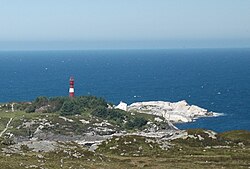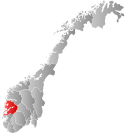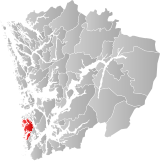Bremnes is a former municipality in the old Hordaland county, Norway. The municipality existed from 1916 until 1963, when it was merged into the new municipality of Bømlo which is now part of Vestland county. The administrative centre of the municipality was the village of Svortland, where Bremnes Church is located. The 125-square-kilometre (48 sq mi) municipality covered the northern and western half of the island of Bømlo as well as the many small, surrounding islets.[3]
Bremnes Municipality
Bremnes herad | |
|---|---|
 View of the Slåtterøy Lighthouse | |
 Hordaland within Norway | |
 Bremnes within Hordaland | |
| Coordinates: 59°47′34″N 05°10′20″E / 59.79278°N 5.17222°E | |
| Country | Norway |
| County | Hordaland |
| District | Sunnhordland |
| Established | 1 July 1916 |
| • Preceded by | Finnås Municipality |
| Disestablished | 1 Jan 1963 |
| • Succeeded by | Bømlo Municipality |
| Administrative centre | Svortland |
| Area (upon dissolution) | |
• Total | 125 km2 (48 sq mi) |
| Population (1963) | |
• Total | 4,829 |
| • Density | 39/km2 (100/sq mi) |
| Demonym | Bremnesing[1] |
| Time zone | UTC+01:00 (CET) |
| • Summer (DST) | UTC+02:00 (CEST) |
| ISO 3166 code | NO-1220[2] |
History
editThe municipality of Bremnes was established on 1 July 1916 when the old municipality of Finnås was split into the three new municipalities: Moster (population: 1,316), Bømlo (population: 1,217), and Bremnes (population: 3,411). During the 1960s, there were many municipal mergers across Norway due to the work of the Schei Committee. On 1 January 1963, the three municipalities of Moster (population: 1,834), Bømlo (population: 1,463), and Bremnes (population: 4,829) were merged into a new, larger Bømlo Municipality.[4]
Name
editThe municipality is named Bremnes (Old Norse: Brimnes). The first element is brim which means "surf" or "the surface of the sea". It is a name that is common in Western Norway, referring to places that are highly exposed to the sea. The last element is nes which means "headland".[5]
Government
editDuring its existence, this municipality was governed by a municipal council of directly elected representatives. The mayor was indirectly elected by a vote of the municipal council.[6]
Municipal council
editThe municipal council (Heradsstyre) of Bremnes was made up of 23 representatives that were elected to four year terms. The party breakdown of the final municipal council was as follows:
| Party name (in Nynorsk) | Number of representatives | |
|---|---|---|
| Labour Party (Arbeidarpartiet) | 2 | |
| Conservative Party (Høgre) | 2 | |
| Christian Democratic Party (Kristeleg Folkeparti) | 8 | |
| Liberal Party (Venstre) | 5 | |
| Local List(s) (Lokale lister) | 6 | |
| Total number of members: | 23 | |
| Party name (in Nynorsk) | Number of representatives | |
|---|---|---|
| Labour Party (Arbeidarpartiet) | 1 | |
| Conservative Party (Høgre) | 3 | |
| Christian Democratic Party (Kristeleg Folkeparti) | 7 | |
| Liberal Party (Venstre) | 5 | |
| Local List(s) (Lokale lister) | 7 | |
| Total number of members: | 23 | |
| Party name (in Nynorsk) | Number of representatives | |
|---|---|---|
| Labour Party (Arbeidarpartiet) | 1 | |
| Christian Democratic Party (Kristeleg Folkeparti) | 3 | |
| Liberal Party (Venstre) | 6 | |
| Joint List(s) of Non-Socialist Parties (Borgarlege Felleslister) | 3 | |
| Local List(s) (Lokale lister) | 7 | |
| Total number of members: | 20 | |
| Party name (in Nynorsk) | Number of representatives | |
|---|---|---|
| Labour Party (Arbeidarpartiet) | 1 | |
| Conservative Party (Høgre) | 2 | |
| Christian Democratic Party (Kristeleg Folkeparti) | 5 | |
| Liberal Party (Venstre) | 5 | |
| Local List(s) (Lokale lister) | 7 | |
| Total number of members: | 20 | |
| Party name (in Nynorsk) | Number of representatives | |
|---|---|---|
| Liberal Party (Venstre) | 8 | |
| Local List(s) (Lokale lister) | 12 | |
| Total number of members: | 20 | |
| Party name (in Nynorsk) | Number of representatives | |
|---|---|---|
| Farmers' Party (Bondepartiet) | 5 | |
| Liberal Party (Venstre) | 7 | |
| Joint List(s) of Non-Socialist Parties (Borgarlege Felleslister) | 2 | |
| Local List(s) (Lokale lister) | 6 | |
| Total number of members: | 20 | |
| Note: Due to the German occupation of Norway during World War II, no elections were held for new municipal councils until after the war ended in 1945. | ||
See also
editReferences
edit- ^ "Navn på steder og personer: Innbyggjarnamn" (in Norwegian). Språkrådet.
- ^ Bolstad, Erik; Thorsnæs, Geir, eds. (26 January 2023). "Kommunenummer". Store norske leksikon (in Norwegian). Kunnskapsforlaget.
- ^ Store norske leksikon. "Bremnes – Hordaland" (in Norwegian). Retrieved 16 February 2015.
- ^ Jukvam, Dag (1999). Historisk oversikt over endringer i kommune- og fylkesinndelingen (PDF) (in Norwegian). Statistisk sentralbyrå. ISBN 9788253746845.
- ^ Rygh, Oluf (1910). Norske gaardnavne: Søndre Bergenhus amt (in Norwegian) (11 ed.). Kristiania, Norge: W. C. Fabritius & sønners bogtrikkeri. p. 129.
- ^ Hansen, Tore; Vabo, Signy Irene, eds. (20 September 2022). "kommunestyre". Store norske leksikon (in Norwegian). Kunnskapsforlaget. Retrieved 1 January 2023.
- ^ "Kommunevalgene og Ordførervalgene 1959" (PDF) (in Norwegian). Oslo: Statistisk sentralbyrå. 1960. Retrieved 16 February 2020.
- ^ "Kommunevalgene og Ordførervalgene 1955" (PDF) (in Norwegian). Oslo: Statistisk sentralbyrå. 1957. Retrieved 16 February 2020.
- ^ "Kommunevalgene og Ordførervalgene 1951" (PDF) (in Norwegian). Oslo: Statistisk sentralbyrå. 1952. Retrieved 16 February 2020.
- ^ "Kommunevalgene og Ordførervalgene 1947" (PDF) (in Norwegian). Oslo: Statistisk sentralbyrå. 1948. Retrieved 16 February 2020.
- ^ "Kommunevalgene og Ordførervalgene 1945" (PDF) (in Norwegian). Oslo: Statistisk sentralbyrå. 1947. Retrieved 16 February 2020.
- ^ "Kommunevalgene og Ordførervalgene 1937" (PDF) (in Norwegian). Oslo: Statistisk sentralbyrå. 1938. Retrieved 16 May 2020.
External links
edit- Bremnes Bygdebøker (local history book) Held at the University of Minnesota Libraries (wilson.lib.umn.edu)